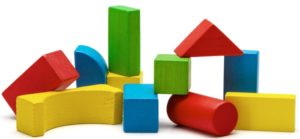 This study is important because it shows (once again) that spatial skills may be developed by what a child does in childhood. The trend for girls to only be given dolls or stereotypically "girl" toys is not that good for mental development (but good for nurturing). All children need to play with blocks, puzzles, and to create and build. They all need to go out and actively explore their environment, which also is good for developing spatial reasoning skills (as shown by earlier research). Think about it: when you actively explore the streets and land around you, you develop "mental maps" of how to get around, and this is good for spatial skills. Bottom line: encourage both boys and girls to build, create, do puzzles, play board games, and explore their outside environment. From Science Daily:
This study is important because it shows (once again) that spatial skills may be developed by what a child does in childhood. The trend for girls to only be given dolls or stereotypically "girl" toys is not that good for mental development (but good for nurturing). All children need to play with blocks, puzzles, and to create and build. They all need to go out and actively explore their environment, which also is good for developing spatial reasoning skills (as shown by earlier research). Think about it: when you actively explore the streets and land around you, you develop "mental maps" of how to get around, and this is good for spatial skills. Bottom line: encourage both boys and girls to build, create, do puzzles, play board games, and explore their outside environment. From Science Daily:
Playing with puzzles, blocks may build children's spatial skills
Play may seem like fun and games, but new research shows that specific kinds of play are actually associated with development of particular cognitive skills. Data from an American nationally representative study show that children who play frequently with puzzles, blocks, and board games tend to have better spatial reasoning ability.
"Our findings show that spatial play specifically is related to children's spatial reasoning skills," says psychological scientist and lead researcher Jamie Jirout of Rhodes College. "This is important because providing children with access to spatial play experiences could be a very easy way to boost spatial development, especially for children who typically have lower performance, such as girls and children from lower-income households."
Being able to reason about space, and how to manipulate objects in space, is a critical part of everyday life, helping us to navigate a busy street, put together a piece of "some assembly required" furniture, even load the dishwasher. And these skills are especially important for success in particular academic and professional domains, including science, technology, engineering, and math (STEM).
Jirout and Newcombe analyzed data from 847 children, ages 4 to 7, who had taken the revised WPPSI [Wechsler Preschool and Primary Scale of Intelligence], which included measures of cognitive skills that contribute to general intelligence. The children's spatial ability was specifically measured via the commonly-used Block Design subtest of the WPPSI, in which children are asked to reproduce specific 2D designs using cubes that have red, white, and half-red/half-white faces. The researchers also examined survey data from parents about the children's play behavior and joint parent-child activities.
The data revealed that family socioeconomic status, gender, and general intelligence scores were all associated with children's performance on the block design task. Children from the low-socioeconomic status group tended to have lower block design scores compared to children from either the middle- or high-socioeconomic status groups. And boys tended to have higher block design scores than did girls, though only after several other cognitive abilities, such as vocabulary, working memory, and processing speed, were taken into account.
Importantly, how often children played with certain toys was also tied to their spatial reasoning skills. Children who played with puzzles, blocks, and board games often (more than six times per week) had higher block design scores than did children who played with them sometimes (three to five times per week), or rarely/never.
None of the other types of play (e.g., drawing, playing with noise-making toys, and riding a bicycle, skateboard, or scooter) or the parent-child activities (e.g., teaching number skills, teaching shapes, playing math games, telling stories) included in the survey data were associated with children's spatial ability.
In line with previous findings, parents reported that boys engaged in spatial play -- playing with puzzles, blocks, and board games -- more often than girls, even after spatial ability was taken into account.
